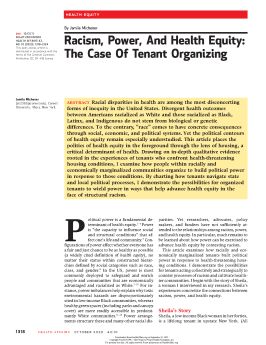Racism, power, and health equity: The case of tenant organizing
As the introduction to this article states, “Much remains to be learned about how power can be exercised to advance health equity by contesting racism” (p. 1318). Based on interviews with tenants facing racial and economic marginalization, the author describes how those tenants used community-organizing methods to build political power to counter unhealthy housing conditions.
Here are some insightful quotes from the article:
- Structural racism “materializes through institutions (including civil and criminal legal systems, housing markets, and city governments) that render decaying housing the norm, make affordable housing scarce, and limit the capacity to ensure the safety of tenants” (p. 1319).
- “People experiencing health-threatening housing conditions have the most at stake, hold firsthand knowledge that can inform policy making, and possess the strongest incentive to alter the status quo. If they lack the capacity to influence the conditions around them, the process of advancing equity will be undermined. This is why power is necessary for building healthy communities” (pp. 1319–1320).
- “Tenants who rent their homes or apartments have opportunities to come into contact with one another, build connections, and share similar experiences. When substandard conditions imperil their health, they face clear and distinct antagonists: landlords, property managers, and others who seek to profit from housing. Such obvious alignments of power lay a foundation for political struggle. Tenant organizing is a critical instantiation of such struggle” (p. 1320).
Through organizing, people are able to see their individual issues are the result of structural inequities and therefore mobilize for collective social and political action. For communities facing marginalization, organizing can activate latent “people power” as a lever for action and change.
To disrupt health inequities, practitioners and scholars need to understand how power works and how it can be used to improve health. The article concludes by outlining ways, in research and in practice, to support power building and advance racial and health equity.
Use this resource to:
- Deepen understanding of the social and structural determinants of health, their relation to power
- Explore how community organizing can contribute to healthier, more equitable communities
- Facilitate discussion about community organizing, power, and the social and structural determinants of health, and the role of public health to advance health equity
Alignment with NCCDH work
NCCDH has described the structural and social determinants of health (and housing in particular), power, and community organizing in the following resources:
Let’s Talk: Determinants of health
Let’s Talk: Community organizing
Let’s Talk: Redistributing power to advance health equity
“Housing: An area for public health action on equity”
Housing as a focus for public health action on equity: A curated list
See other resources on community organizing.
Reference
Michener, J. (2023). Racism, power, and health equity: The case of tenant organizing. Health Affairs, 42(10):1318–1324. https://doi.org/10.1377/hlthaff.2023.00509
Tags: Community engagement, Housing, Structural determinants, Power
